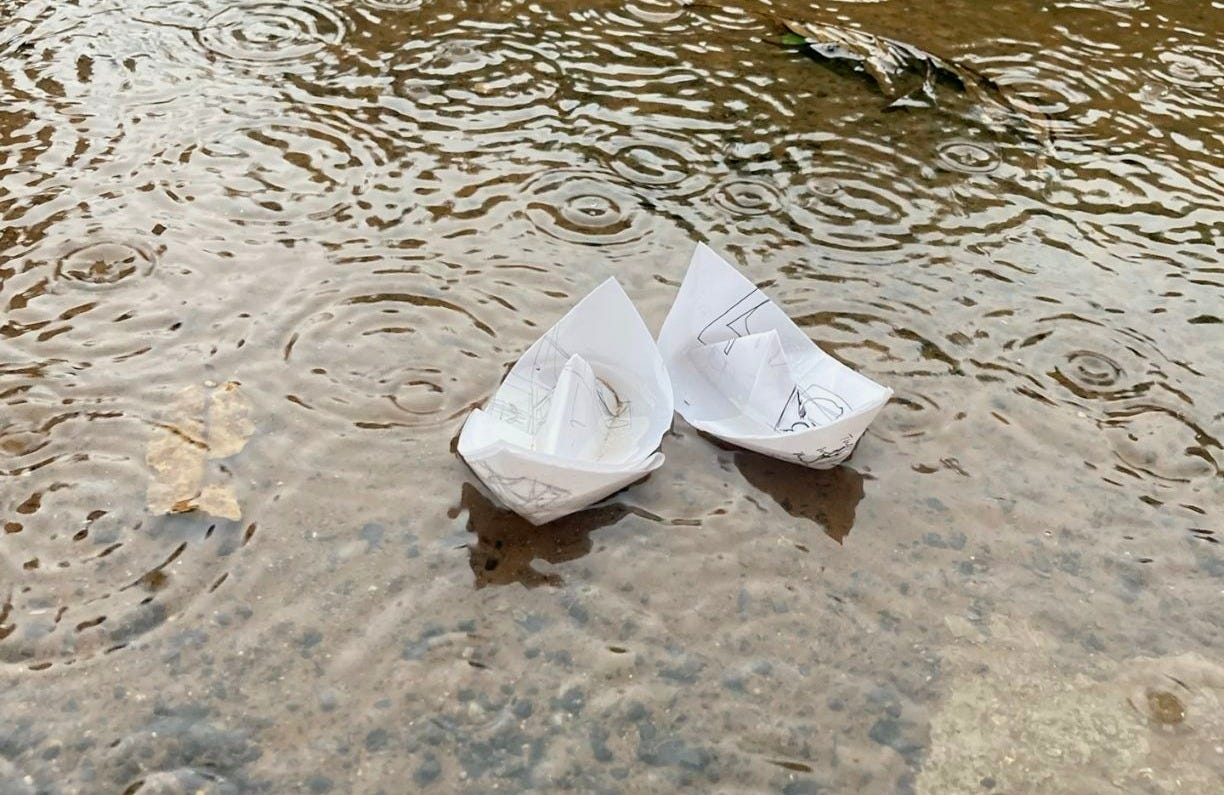A rainy week is an indicator of a new season, a new change, the unmistakable marker of the flow of time. The cool petrichor sticks close to the earth, and the soil brings out bouts of nostalgia and traditions. You want to rub your arms and eat those comfort foods: something warm and oily, preferably crispy and crunchy to echo the sounds of rain falling.
Perhaps it’s precisely this sensory stimulation that triggers buried memories and emotions: of bathing in the rain on rooftops, jumping in puddles on the way back home, trudging through ankle-deep water and walking a kilometre with wet socks, shoes taking two days to dry, friends daring you to run to the other campus, making paper boats to feel something, dancing, and everything lost in memories. Among all this is the lingering sadness of losing the feeling of having the vast world at your fingertips and the curiosity of childhood trail along with rain.
The song here tries to capture this collective nostalgia, narrating universal all too familiar scenes of desi childhood.

Where did those days go
Kahan Wo Din Gaye (2021) by Dream Note
in those rainy evenings following clouds through windows rubbing away tears and kissing the drops the drafting petrichor erases away tomorrow's worries in the paper boats floating away the secrets where did those days go where did they were lost where did those days go where did they were lost in those foggy dawns going outside to travel and when the sun began to set finding the corners of the sheet during those shivering winter nights roasting those snacks on the fire lying down on the bed and then singing old songs and tunes where did those days go where were they lost where did those days go where were they lost we will not run in streets again chasing after the cut kites we will watch our favourite street sports from a far away vantage points and what have we gained on this side our pockets are filled but where is the peace what did we gain by being here look, all is left on the other side
Urdu Lyrics
بارشوں کی شاموں میں جو کھڑکیوں سے بادلوں کو دیکھتے آنکھوں کو موندیں چومتے ہاتھوں سے بوندیں سوندھی خوشبو مٹی کی تھی بھولاتی فکر کل کی کاغذوں کی کشتیوں میں ہم بہاتے راز اپنے کہاں وہ دن گئے کہاں وہ کھو گئے کہاں وہ دن گئے کہاں وہ کھو گئے کہرے میں ڈوبی سحر کی ہم نکلتے سیر کرنے ڈوبنے لگتا جو سورج ڈھونڈنے چادر کے کونے کانپتی سردی کی راتیں آنچ پہ سیکھتے وہ دانے کاٹ پر پھر لیٹ کے جو گنگناتے تھے ترانے کہاں وہ دن گئے کہاں وہ کھو گئے کہاں وہ دن گئے کہاں وہ کھو گئے اب نہ دوریں گئے گلی میں ہم پتنگوں کو پکڑنے دور سے ہی دیکھ لیں گئے کھیل سب اپنی پسند کے اب نہ دوریں گئے گلی میں ہم پتنگوں کو پکڑنے دور سے ہی دیکھ لیں گئے کھیل سب اپنی پسند کے اور اس پار کیا ہے ملا جیبیں بھری ہیں سکون کہاں کیا حاصل ہو کر یہاں سب رہ گیا ہے دیکھو وہاں اور اس پار کیا ہے ملا جیبیں بھری ہیں سکون کہاں کیا حاصل ہو کر یہاں سب رہ گیا ہے دیکھو وہاں کہاں وہ دن گئے کہاں وہ کھو گئے کہاں وہ دن گئے کہاں وہ کھو گئے
Transliteration
From the official YouTube Video
Baarishon ki shaamon me jo Khirkiyon se baadalon ko Dekhte aankhon ko moondein Choomte hothon se boondein Saundi khusbooein mitti ki Thi bhulati fikr kal ki Kaagazon ki kashtiyon me Hum bahate raaz apne Kahan woh din gaye Kahan woh kho gaye Kahan woh din gaye Kahan woh kho gaye Kohre me doobi seher ki Hum nikalte sair karne Doobne lagta jo suraj Dhoondhte chaadar ke kone Kaanpti sardi ki raatein Aanch pe sikte woh daane Khaat par phir late kar jo Gungunate the taraane Kahan woh din gaye Kahan woh kho gaye Kahan woh din gaye Kahan woh kho gaye Ab na daudenge gali me Hum patango ko pakadne Door se hi dekh lenge Khel sab apni pasand ke Ab na daudenge gali me Hum patango ko pakadne Door se hi dekh lenge Khel sab apni pasand ke Aur iss paar, kya hai mila Jebein bhari hain, sukoon kahan Kya haasil ho ke yahan Sab reh gaya hai dekho wahan Aur iss paar, kya hai mila Jebein bhari hain, sukoon kahan Kya haasil ho ke yahan Sab reh gaya hai dekho wahan…
Word of the day
کل — kal (masculine, singular noun)
meaning: yesterday or tomorrow
The Urdu language employs the same word for yesterday and tomorrow, the ambiguous ‘kal’ that can only be deciphered in context, especially the verbs and actions around it. This flexibility allows a weird intermixing of time and even calls into question the linearity of a timeline. So it is difficult to discern whether the song refers to the worries of yesterday or tomorrow. I translated it into tomorrow to maintain the storytelling narrative of the song, that the listener and teller are reminiscing on past days and not living through it. If the song speaks to you of yesterday's worries, then perhaps you're reliving the past and carrying a burden on your shoulders. It's not fixed, as such the meaning changes from day to day. That is precisely its beauty.
ABOUT. Dream Note is a dynamic music duo from Jaipur, Rajasthan (India), consisting of songwriter Gaurav Tiwari and producer Taresh Agarwal. Their most famous song is Waqt Ki Baatien.
TARJUMAN might include an excerpt section for my favourite parts of the song instead of translating the whole song in the future. If it’s something you’d be interested in or some song you would like to see on TARJUMAN, please let me know through the comments.





Vantage memories
I WILL COME BACK TO READ THIS WHEN MY EAR POPS OPEN IN THREE YEARS